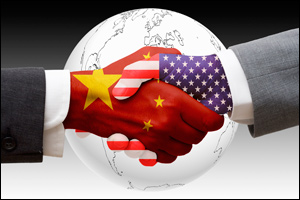 originally Posted: Mon., Dec. 5, 2011, 2:00pm PT
originally Posted: Mon., Dec. 5, 2011, 2:00pm PT
http://www.variety.com/article/VR1118046739#.Tua0UDeUm_0.email
Hollywood has always been on the hunt for foreign financing, which seems to arrive in successive waves from different parts of the world over the years. Successive infusions of cash boosting the fortunes of studios and indies alike have recently come from Europe, the Middle East and India.This year’s craze appears to be coin from China, with showbiz execs having high hopes for partnerships with that large and growing market — but also harboring some misgivings.
While it’s true that the world’s most populous nation has a booming cinema sector, China has also erected an array of barriers to entry. Still, more Hollywood businesses have been planted in China than is generally realized.
Twentieth Century Fox has co-produced three Chinese-language films — all profitable — including 2010′s “Hot Summer Days,” a $2.25 million production with partner Huayi Bros. Media that grossed $22 million at China’s theatrical box office. And because it’s considered a Chinese production, “Hot Summer Days” was exempt from the country’s 20-title per year import quota that limits access for foreign films.
Sanford Panitch, president of Fox Intl. Productions, says in certain respects working under China’s rules is similar to working with a Hollywood studio in that producers face a multi-step approval process whose requirements are well known in advance.
“In some ways, it’s not so mysterious or Byzantine as people imagine,” Panitch says.
Relativity Media is a part owner of Chinese media outfit Sky Land, which in October announced English-language youth comedy co-production “21 and Over” wrapped production after shooting in both in Seattle and China.
“As long as you abide by their rules, the Chinese are generally very cooperative and helpful,” says Relativity Media CEO Ryan Kavanaugh. “They are not anti-company. That being said, they don’t want someone coming (into China) like it’s a free-for-all.”
One of the easiest avenues for access is to co-produce movies, because even if they are English-language pictures they are exempt from the quota that limits imports. With that in mind, Nu Image/Millennium Films is fashioning “Expendables 2″ as a Chinese co-production.
Specialist Hollywood ad agency Cimarron Group recently launched a Beijing office that now has several Chinese employees. Cimarron CEO Robert Farina says getting the permit to open the office required a lot of paperwork and was time consuming, but was straightforward. He adds that the high skill levels of job applicants impressed him, so finding qualified staff is not a problem, though some rank-and-file Chinese workers don’t yet have a grasp of global business techniques.
As for other media boots on the ground, Disney broke ground in April on a $4 billion resort and theme park in Shanghai with some funding coming from its Chinese partner. Meanwhile, Imax theaters are sprouting in China and other Hollywood movie outfits besides Fox and Relativity have dipped their toes in various TV and film co-production.
In fact, the MPAA screened a showcase of eight U.S./China film co-productions in November at a Washington, D.C.-area movie theater. Warner Bros.-based Legendary Pictures — which is 3.3% owned by China’s Orange Sky Golden Harvest Entertainment — made headlines in August when it established its Legendary East venture with Huayi Bros. Media.
Also, an elaborate Chinese version of the musical “Mamma Mia!” is being staged under license using local performers, and DreamWorks Animation is said to be actively scouting for executives for an animation production arm in China.
On the other hand, some Western companies entering China have experienced problems or retreated. Fakes of famous brands are an issue, with stores misappropriating signage from such companies as Apple and Disney. And recently the Chinese government ordered Lady Gaga songs removed from websites for “national cultural security.”
Yahoo is in a dispute over the sale of a valuable asset by its China venture and the Weinstein Co. got bad press over a rocky financing road for its co-production period drama movie “Shanghai.” In a pull-back, News Corp. recently agreed to sell its controlling interest in three TV channels and film library to a local entity.
The Office of the U.S. Trade Representative won a World Trade Organization ruling that China unfairly restricts access for copyrighted products including movies, TV programs and music, though China did not comply with rulings by a March deadline.
“The two governments are talking,” says Greg Frazier, exec VP of trade policy at the MPAA, “and we’ll see what happens … China is sort of a market unto itself.”
While cinema in China is booming, the MPAA notes that imported Hollywood films subject to the 20-film quota garner a meager 13% of box office under government rules, which is “the lowest ratio in the world.”
Other sources say China views the adverse WTO ruling as simply a starting point for negotiations. In any event, the world’s second-largest economy is far from timid about leveraging its clout and its economic power, which give it greater capability to arm-twist and push back than has been enjoyed by other emerging countries that Hollywood and Washington have faced in the past.
Still, that economic power also represents significant new opportunities for Hollywood, including a lively stock market that media companies can tap to raise financing by selling securities.
Moreover, China’s growing number of very wealthy individuals, who find returns offered by conventional banks meager, may someday emerge as yet another a potential source of film financing.
“There’s lots of appetite right now for film investment in China, but most of it is focused on financing Asian-language product with mostly regional appeal,” says Alan Cole-Ford, a former Paramount and MGM executive who is private multinational investor active in China. “Much but not all of the time, that’s what Chinese audiences really will pay to see.”
Richard Trombly richard@trombly.com www.obscure-productions.com is an American writer, journalist and filmmaker who has been living in China since 2003 and has